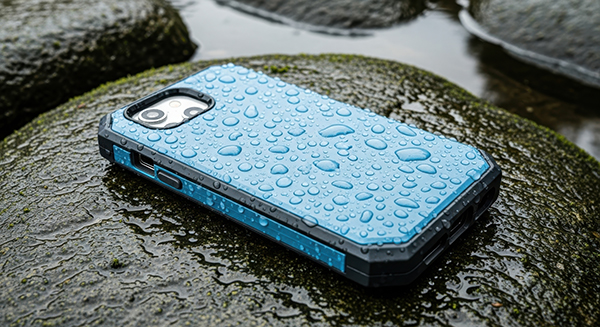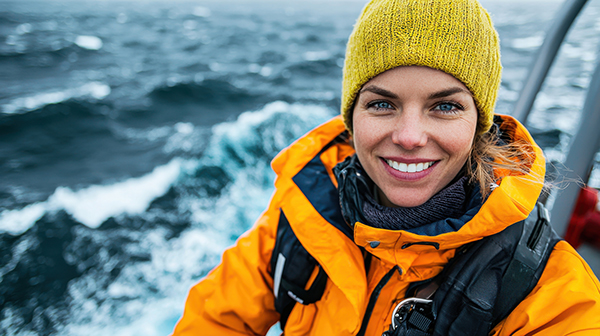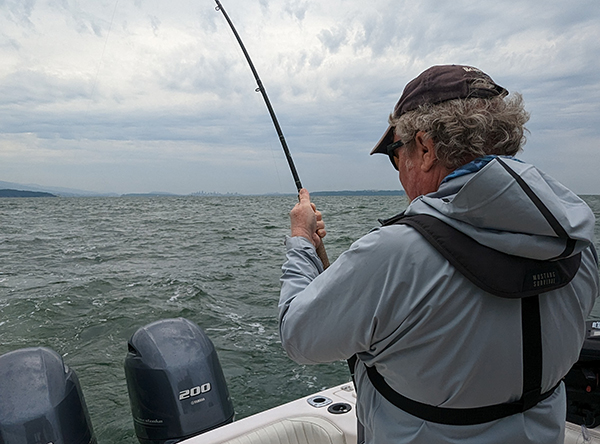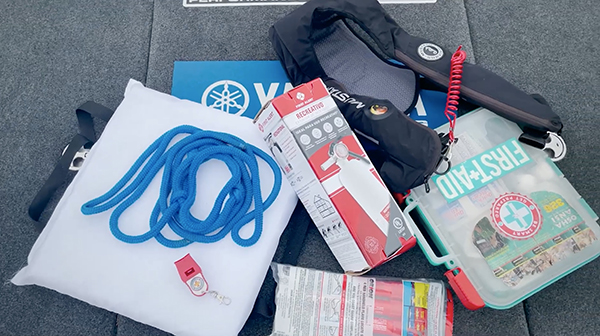For many up north, the boating season only stops when the water morphs from a liquid state into a solid. Anglers are an especially hardy bunch who will brave the most harsh conditions to fish. But while boating and fishing are still possible when the temperature drops, the colder it gets, the more precautions are needed to do them safely. Even when the air temperature rises during a warm front during the late fall, winter and early spring, the water temperature can still be shockingly cold and hazardous should you fall in.
Safe cold-weather boating requires knowledge, preparation, and sound judgment to avoid hypothermia, a condition in which the body temperature falls below 95 degrees due to prolonged exposure to cold and can lead to death if the cooling process isn’t halted. If a person is dry, they can withstand extreme conditions when appropriately dressed, but when wet, the danger accelerates.
If you ask most boaters how long it takes for hypothermia to set in, they will say about 15 minutes if they’re immersed in frigid water. Surprisingly, it can often take more than an hour, and there are documented cases of boaters surviving for many hours of immersion, but only if specific steps are taken.
Pre-Trip Planning
A cold-weather outing starts with checking the forecast to make sure there won’t be rain or high winds, which can greatly accelerate cooling and make conditions more hazardous due to wet, rocking decks. A must is to file a detailed float plan and share it with a reliable person on land, who will call for help if you don’t check in with them at the end of the day.

Communication Capability is Critical.
Keep a cell phone in a waterproof case in your pocket. A cell phone that becomes wet or is located in a glove compartment is of zero use to you should you fall overboard and be unable to reboard. Consider buying a personal locator beacon (PLB) like a Spot X®, which communicates via satellite rather than cell phone signals, can quickly summon help in an emergency, and even allows two-way communication.
How to Dress for Cold-Weather Boating
Because a boat can move at high speed, wind chill should not be overlooked. A boater traveling at 30 mph in 40-degree weather experiences a perceived temperature below 29 degrees. In these conditions, full coverage is the goal, as any exposed skin could be susceptible to frostbite. The human body is like a furnace that produces heat, and proper clothing can trap that heat to keep you warm.
Start with a clothing layer next to the skin that wicks away moisture. Cotton undergarments and Denim blue jeans are probably the worst choices for this layer because if they get wet, they stay wet. Cotton’s straight fibers don’t trap warm air, and when sodden, keep water in contact with the skin, which conducts heat away from the body 25 times faster than air.
.jpg)
The next layer should provide insulation, which traps warm air heated by the body. A thick sweater made of wool or polyester is ideal because its crinkly fibers provide space for warm air to surround. Fabrics like Merino wool can even retain heat when wet.
The outer layer should be a shell that totally blocks the wind. Without it, the trapped warm air in the inner layers would escape if it’s windy or the boat is moving. Don’t forget to wear high-quality gloves and hats to prevent heat loss from these extremities. For pants, consider wearing ski pants, which have excellent insulation and are windproof and waterproof.
Activities That Increase the Risk of Going Overboard
The key to staying on the dry side of the gunwale is to avoid activities that increase your chance of falling. Alcohol consumption is one of the highest risk factors. It impedes balance and impairs judgment, which can lead to risky behavior and lessen the ability of a person who has fallen into the water to take the correct actions to remedy their situation.
Activities that take a person to the edge of a gunwale or casting platform, such as throwing a cast net or reaching to gaff or net a fish, can lead to trouble. The U.S. Coast Guard has documented men answering the call of nature as a contributing factor (it’s safer to use a bucket).
Avoid Situations That Have Increased Risk
Fishing solo when the water is cold is more dangerous than when other people are on board who can assist with reboarding. Also, if you are fishing alone, avoid activities like trolling or anchoring in deep water with a strong current running, because if you fall overboard, there is little chance of reaching the boat to get back aboard. If you are fishing alone, consider staying in shallow water so that if you fall overboard you can stand up. Also, use a wireless ECOS device, which will automatically cut off the engine should you fall over. When fishing solo, a class I life jacket is recommended.

Always Wear a Life Jacket When Boating in Cold Water
Those who don’t wear a life jacket when boating in cold water won’t have to worry about hypothermia because they likely won’t live long enough for it to occur should they fall overboard. While inflatable life jackets are more comfortable, wearing a class III jacket provides extra insulation, which helps preserve your core heat. A good alternative to a life jacket is a float coat, which keeps you warm in and out of the water while still providing decent freedom of movement.
Be Prepared for the Shock of Cold-Water Immersion
The first thing that happens when a person falls into cold water is cold-water shock, which causes uncontrollable gasping for air and a severe increase in heart rate that can lead to panic or even a heart attack. Of those who perish, around 20 percent never make it past this initial stage. Knowing in advance that this phase only lasts a couple of minutes can help you survive to the next stage of cold-water immersion. Be sure to brief all those aboard about this effect so it doesn’t catch them by surprise. Always be cognizant that you could fall overboard and inhale water, which can be fatal.

The First 10-20 Minutes are Critical for Survival
Because of the debilitating effects of cold water, a person’s excellent swimming ability is of limited use in this situation. To protect a person’s core temperature, the body’s natural defense mechanism is to shut off circulation to the arms and legs, which restricts their ability to move and swim. In addition, swimming radiates cold water across the body, further accelerating its debilitating effects. If the shore isn’t extremely close, don’t try to swim for it. Instead, use the first 10-20 minutes to try to get out of the water, or at least improve your situation, like activating a PLB or making a phone call. The colder the water, the faster the physical decline occurs.
How to Survive Until Help Arrives
If you are unable to get into the boat or reach shallow water, go into a defensive posture known as the Heat Escape Lessening Position (H.E.L.P.), which is a fetal position with your knees pulled up to your chest. When in this position, people have lasted hours, even in freezing water.

Don’t quit fighting, even if you’ve been rescued; the danger isn’t over yet. There is a reaction called circum-rescue collapse, which is a crash of vital signs shortly after a person is pulled from the water when they relax. Also, avoid sitting or standing. Laying down and being wrapped in warm blankets or coats is better.
If you fish or boat in cold weather, be prepared and educated to the effects should you fall overboard.
Back to Blue Life
Safe cold-weather boating requires knowledge, preparation, and sound judgment to avoid hypothermia, a condition in which the body temperature falls below 95 degrees due to prolonged exposure to cold and can lead to death if the cooling process isn’t halted. If a person is dry, they can withstand extreme conditions when appropriately dressed, but when wet, the danger accelerates.
If you ask most boaters how long it takes for hypothermia to set in, they will say about 15 minutes if they’re immersed in frigid water. Surprisingly, it can often take more than an hour, and there are documented cases of boaters surviving for many hours of immersion, but only if specific steps are taken.
Pre-Trip Planning
A cold-weather outing starts with checking the forecast to make sure there won’t be rain or high winds, which can greatly accelerate cooling and make conditions more hazardous due to wet, rocking decks. A must is to file a detailed float plan and share it with a reliable person on land, who will call for help if you don’t check in with them at the end of the day.

Communication Capability is Critical.
Keep a cell phone in a waterproof case in your pocket. A cell phone that becomes wet or is located in a glove compartment is of zero use to you should you fall overboard and be unable to reboard. Consider buying a personal locator beacon (PLB) like a Spot X®, which communicates via satellite rather than cell phone signals, can quickly summon help in an emergency, and even allows two-way communication.
How to Dress for Cold-Weather Boating
Because a boat can move at high speed, wind chill should not be overlooked. A boater traveling at 30 mph in 40-degree weather experiences a perceived temperature below 29 degrees. In these conditions, full coverage is the goal, as any exposed skin could be susceptible to frostbite. The human body is like a furnace that produces heat, and proper clothing can trap that heat to keep you warm.
Start with a clothing layer next to the skin that wicks away moisture. Cotton undergarments and Denim blue jeans are probably the worst choices for this layer because if they get wet, they stay wet. Cotton’s straight fibers don’t trap warm air, and when sodden, keep water in contact with the skin, which conducts heat away from the body 25 times faster than air.
.jpg)
The next layer should provide insulation, which traps warm air heated by the body. A thick sweater made of wool or polyester is ideal because its crinkly fibers provide space for warm air to surround. Fabrics like Merino wool can even retain heat when wet.
The outer layer should be a shell that totally blocks the wind. Without it, the trapped warm air in the inner layers would escape if it’s windy or the boat is moving. Don’t forget to wear high-quality gloves and hats to prevent heat loss from these extremities. For pants, consider wearing ski pants, which have excellent insulation and are windproof and waterproof.
Activities That Increase the Risk of Going Overboard
The key to staying on the dry side of the gunwale is to avoid activities that increase your chance of falling. Alcohol consumption is one of the highest risk factors. It impedes balance and impairs judgment, which can lead to risky behavior and lessen the ability of a person who has fallen into the water to take the correct actions to remedy their situation.
Activities that take a person to the edge of a gunwale or casting platform, such as throwing a cast net or reaching to gaff or net a fish, can lead to trouble. The U.S. Coast Guard has documented men answering the call of nature as a contributing factor (it’s safer to use a bucket).
Avoid Situations That Have Increased Risk
Fishing solo when the water is cold is more dangerous than when other people are on board who can assist with reboarding. Also, if you are fishing alone, avoid activities like trolling or anchoring in deep water with a strong current running, because if you fall overboard, there is little chance of reaching the boat to get back aboard. If you are fishing alone, consider staying in shallow water so that if you fall overboard you can stand up. Also, use a wireless ECOS device, which will automatically cut off the engine should you fall over. When fishing solo, a class I life jacket is recommended.

Always Wear a Life Jacket When Boating in Cold Water
Those who don’t wear a life jacket when boating in cold water won’t have to worry about hypothermia because they likely won’t live long enough for it to occur should they fall overboard. While inflatable life jackets are more comfortable, wearing a class III jacket provides extra insulation, which helps preserve your core heat. A good alternative to a life jacket is a float coat, which keeps you warm in and out of the water while still providing decent freedom of movement.
Be Prepared for the Shock of Cold-Water Immersion
The first thing that happens when a person falls into cold water is cold-water shock, which causes uncontrollable gasping for air and a severe increase in heart rate that can lead to panic or even a heart attack. Of those who perish, around 20 percent never make it past this initial stage. Knowing in advance that this phase only lasts a couple of minutes can help you survive to the next stage of cold-water immersion. Be sure to brief all those aboard about this effect so it doesn’t catch them by surprise. Always be cognizant that you could fall overboard and inhale water, which can be fatal.

The First 10-20 Minutes are Critical for Survival
Because of the debilitating effects of cold water, a person’s excellent swimming ability is of limited use in this situation. To protect a person’s core temperature, the body’s natural defense mechanism is to shut off circulation to the arms and legs, which restricts their ability to move and swim. In addition, swimming radiates cold water across the body, further accelerating its debilitating effects. If the shore isn’t extremely close, don’t try to swim for it. Instead, use the first 10-20 minutes to try to get out of the water, or at least improve your situation, like activating a PLB or making a phone call. The colder the water, the faster the physical decline occurs.
How to Survive Until Help Arrives
If you are unable to get into the boat or reach shallow water, go into a defensive posture known as the Heat Escape Lessening Position (H.E.L.P.), which is a fetal position with your knees pulled up to your chest. When in this position, people have lasted hours, even in freezing water.

Don’t quit fighting, even if you’ve been rescued; the danger isn’t over yet. There is a reaction called circum-rescue collapse, which is a crash of vital signs shortly after a person is pulled from the water when they relax. Also, avoid sitting or standing. Laying down and being wrapped in warm blankets or coats is better.
If you fish or boat in cold weather, be prepared and educated to the effects should you fall overboard.
Back to Blue Life
